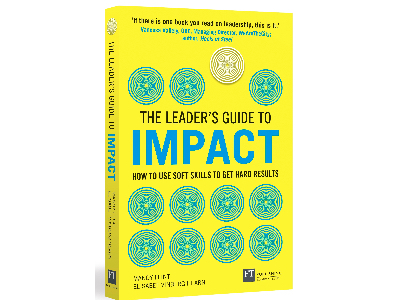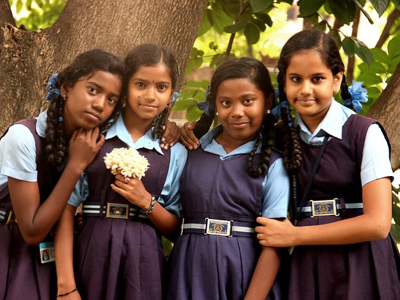I was at Billabong High International School Bhopal, interacting with a few of our teenage students who were sharing their pain points while interacting with parents and while giving them solutions for their pains points I got the idea of writing a book that would address both Parents and Teens.

Image via Shutterstock
Most books address only one audience, the unique thing about this book is the format. For each topic I write to the parent and then the teen – giving them a chance to step into each other’s shoes and therefore bridge the generation gap.
A book on dealing and transforming teenagers is a challenge. Chances are that most parents who reach out for this book have mindfully parented their children to the best of their ability making all the same human mistakes most parents will make. I write this book to help them understand their teens. I hope many teens read this book to become aware of what changes their brain and bodies are going through and therefore avoid some of the pitfalls most teenagers will go through.
Overview of the Book
“Raising teenagers is like nailing Jell-O to a tree.” –Unknown
Parentspeak
At the age of 5 your child and you would possibly dialogue like this:
“Will you set the table for dinner?”
“Sure Mom”
“Have you completed your homework”
“Yes Mom”
“You want to shoot a few baskets with me son?”
“Great. Let’s go dad!”
During his teens the dialogue would mostly be like this:
“Will you set the table for dinner?”
“Why do you always pick on me to do work?”
“Have you completed your homework?”
(If you receive an affirmative response it may be best to check!)
“School is so dumb. The teachers don’t understand anything.”
“You want to shoot a few baskets with me son?”
“Nah.”
The Newtonian view sees the world like a machine – a set of parts assembled together to function in a predictable manner – like clockwork.
Quantum theory, in contrast, turns this view upside down – discovering the impossibility of predicting anything in this universe.
When it comes to Teenagers it is definitely the Quantum theory at work! Most parents cease to recognize their child as soon as the teen button gets set. “No way! Definitely not a product of our DNA or the nurturing we provided or the values we taught as parents.” It seems to most parents that an alien has invaded their child’s teen body and this throws most parents into a tizzy. They don’t seem to want to get out of bed, contribute to any home chores, relate to others and everything that can be forgotten will be. The teenager seems to be indefinable and ‘unanalyzable’.
In “Who do you think you’re kidding” I map parenting from a neuroscience perspective from the womb stage to flying from the nest stage. Much of the child’s habits, values, self-esteem and self-belief are etched in stone by the time they become teens. As parents we have already been matching and reinforcing patterns of behavior from birth. Kids are usually marked at a very young age “As pretty as her mother”, “As stubborn as his grandfather”, “As gentle as….”, “As loving as…”, “As messy as….” And so on. Reputations become built and reinforced. Facets of behavioral types become stronger as they get reinforced. As adults comment on a child’s laziness, chances are he will become lazier. Other qualities will recede as they fail to be recognized and reinforced by the people around them. So while we may comment on their perceived negative behavior we serve to strengthen it and while we neglect their perceived ‘normal’ behavior we actually become instrumental is seeing less of it.
This typecasting ignores the infinite potential in people that quantum theory points to. New science says that people are capable of a wide variety of responses – depending on how we relate to them. Can we interact in a way gets the best out of the other person? Quantum mechanics says we can – it is as much in our hands as the other person’s. The Connected Age calls for us to recognize this phenomenon and act from a reality that empowers everyone to shape our world’s responses to us. The question is whether we as parents are willing and able to make this shift? Can we trust that our responses and expectations will make a difference in the outcome for our teenage kids?
A book on dealing and transforming teenagers is a challenge. If a child has suffered huge amounts of stress growing up in the form of abandonment, physical or emotional threat, violence, physical or emotional neglect or abuse it is fair to say that counseling or mindful parenting suddenly turned on during teenage hood may not be able to repair or bring that teenage brain or behavior completely ‘on track’. Childhood abuse and maltreatment can shrink important parts of the brain and I will refer to some of the research later on in the book.
Chances are that most parents who reach out for this book have mindfully parented their children to the best of their ability making all the same human mistakes most parents will make. I write this book to help them understand their teens. I hope many teens read this book to become aware of what changes their brain and bodies are going through and therefore avoid some of the pitfalls most teenagers will go through. I know that my understanding of the stages of development helped me get through the turbulent teen years that my son inflicted on us. Most parents who have undergone the teenage experience will recognise the teenage symptoms that I described in Who Do You Think You Are Kidding. Sleeping long hours, room a complete pig sty, procrastinating with tasks to be completed including school work, defiance, experimentation and risk taking behaviour. If parents are aware of what is occurring in the brain and body of their teen children then perhaps they can respond to their child and each challenging situation rather than react impulsively which can often make things worse. I know that I was able to cope with my teenage son Drish and calm the nerves of others as I was aware that what was happening will happen to most parents of teens and was actually a natural occurrence in the stage of development from a neuro and behavioural science point of view.
The teenage stage is all about pushing boundaries and limits. Hopefully this book will assist parents with an understanding of this stage and provide some tools and resources to make this challenging time a little less challenging.
“According to parents we’re too young for love, too old for fun, too smart to play dumb and too immature for grown up conversations. It’s no wonder teens are so rebellious! There’s nothing else to do!” Teenage quote
Teenspeak
Needless to say that I was once a teenager (although it seems like eons ago) with all the typical teenage thoughts (I hate my Mom. Why does my Dad think he always knows better? Why don’t they just get it? Why won’t they leave me alone? Why are they always trying to control me?) I also now have a 22 year old son who was once a teenager. In addition to that my profession demands I interact with teenagers. I am not proclaiming that this makes me an absolute expert in this field but hopefully I may be able to make the Drama Teen years a little less painful for you and for your parents by taking you through the physical and mental changes that take place during these years and are the cause of many teen parent conflicts.
In my research of the brain and how the brain best learns I came across the discovery of neuroplasticity, which says that our thoughts can change the structure and function of our brains. This can happen even into old age but the impact during the teenage years while your brain is actually going through a process of restructuring is the most intense. Neuroplasticity is the most important breakthrough in our understanding of the brain in four hundred years. If you understand the significance of this and apply the learning it may impact the outcome of your life.
My reason to write this book for a dual audience namely you and your parents is to allow each side to see that there are no two sides and to allow for a common point of perception.






